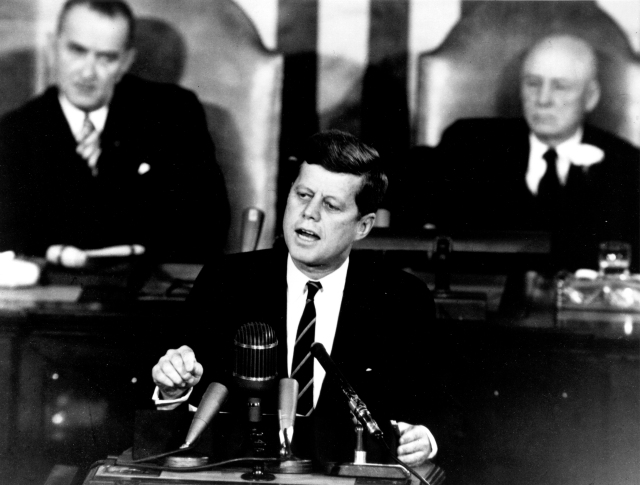
John F. Kennedy delivering his “Urgent National Needs” Speech to a joint session of Congress on May 25, 1961. Among other initiatives, but the one that is most remembered, he said, “I believe this nation should commit itself, before this decade is out, of landing a man on the Moon and returning him safely to Earth.”
Tomorrow will be the 52nd anniversary of President John F. Kennedy announcing the decision to pursue a Moon landing by the end of the decade of the 1960s. On May 25, 1961, he stood before a joint session of Congress and a television audience to speak about what he termed “Urgent National Needs.” That announcement, and especially its realization with the Apollo 11 mission in July 1969, has left an indelible mark on public perceptions of spaceflight and American culture. While it was an enormous achievement, Apollo left a divided legacy for NASA and the aerospace community. The perceived “golden age” of Apollo created for the agency an expectation that the direction of any major space goal from the president would always bring NASA a broad consensus of support and provide it with the resources and license to dispense them as it saw fit.
Something most of us in the spaceflight community have failed to appreciate is the exceptionally unique situation that drove the Kennedy administration to make this decision. Indeed, the events that led to JFK’s Apollo announcement had not been a normal situation and would not be repeated. The Apollo decision was, in reality, an anomaly in the national decision-making process. This proved to be true in part because of its reliance on presidential prerogative, made possible only because of its national defense implications.
Space exploration enthusiasts, however, greeted Ronald Reagan’s space station directive in the State of the Union Address in 1984 as a political mandate to take the “next logical step” in space. NASA established a schedule to produce a space station, as Reagan had directed, by 1994. But nothing happened. Eight years after Kennedy offered his challenge, Americans stood on the Moon. Ten years after President Reagan issued his directive, NASA and its political overseers were still debating space station design.
Not until the inevitable confrontation with reality for exploration advocates during the debate over the Space Exploration Initiative (SEI) in 1989 to return to the Moon and go on to Mars did those associated with NASA fully learn that the myth of presidential leadership in dictating the Apollo decision was not the norm. The demise of SEI, concurrent with continuing troubles for the Earth-orbiting space station, at last forced space exploration champions to question long-held assumptions about presidential omnipotence. Faith in the ability of presidential commitments to free space policy from the constraints of Washington politics finally declined.
As journalist Leonard David pointed out in a popular article in 1990, expensive space efforts such as SEI were extremely tough sells. Space had ceased to be special by the time the first Americans reached the Moon. But Kennedy’s decision had excited the expectation that presidential leadership could carry space policy above politics.
The symbolism of Kennedy’s Apollo commitment has held special appeal for the true believers of space exploration to the present. To them, the lunar decision suggested that space exploration deserved special treatment within the American political system. The decision to go to the Moon implied that a president could overcome partisan divisions and lead the nation to great accomplishments, if only the objective was properly framed. Many argued that the subsequent ills of the space program could be traced to the unwillingness of later presidents to make “Apollo-like” public commitments. Unfortunately, while this was an illusion it has held sway for more than a generation and I would suggest that many still cling to it.



The bold commitment of President Kennedy has, unfortunately, been interpreted as a commitment to space exploration. It was not. It was a commitment to national pride and assertion of national technical superiority. This misinterpretation by “space exploration champions” has led them to look to presidential leadership for future space exploration. It happened once, they argued. No, it didn’t happen that way at all. The rationale for human space flight became reflexive in the sense that if it was once good enough for us, it should always be. As a result, little careful thought was henceforth invested in that rationale. Human space flight in our nation is paying for that lack of investment now. By the time we reached the Moon, it wasn’t space that ceased to be special. It was the need to assert national technical superiority in space that ceased to be necessary. The Apollo program succeeded in what it was called upon to do. The box was checked.
LikeLike
Pingback: Why we can’t send humans to Mars yet, and how we’ll fix that | IGV News Online
Pingback: The Wages Of Foreign Policy – The Price Of A Man On The Moon – June 4, 1961 | Past Daily
Pingback: May 25, 1961, 55 years ago: John Kennedy challenged America to go to the Moon | Millard Fillmore's Bathtub
Pingback: May 25, 1961, 56 years ago: John Kennedy challenged America to go to the Moon | Millard Fillmore's Bathtub